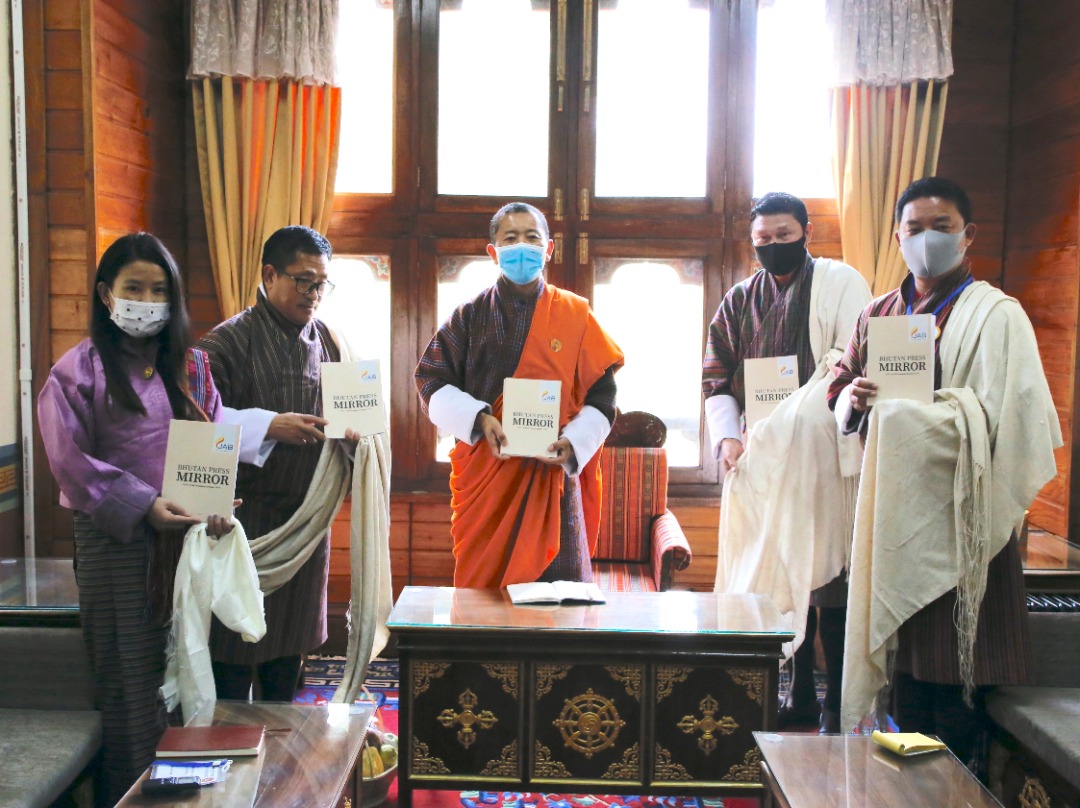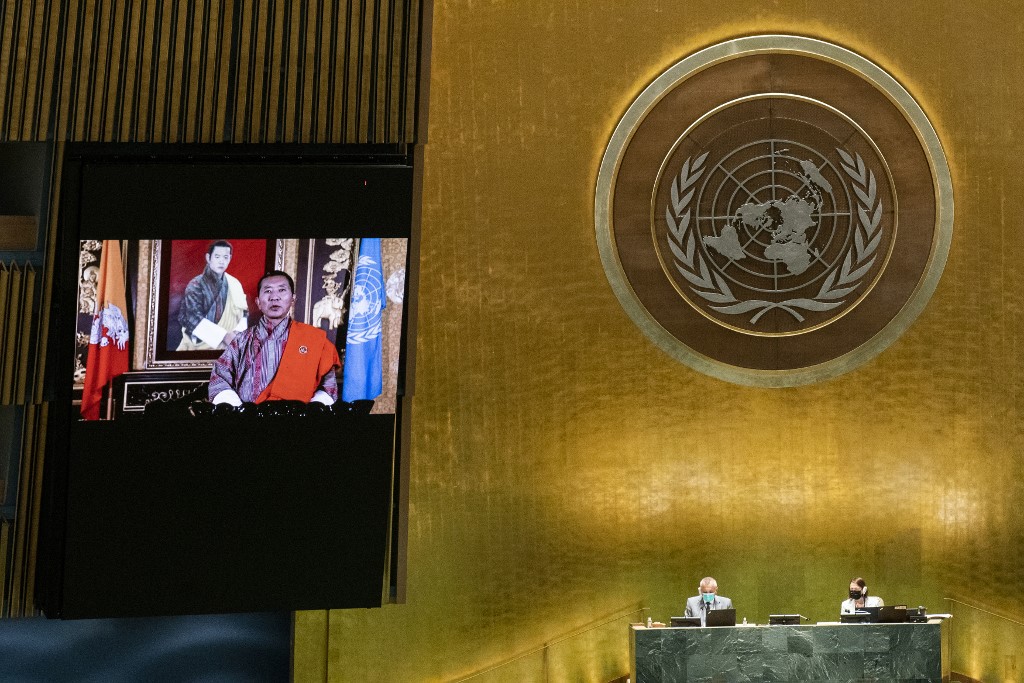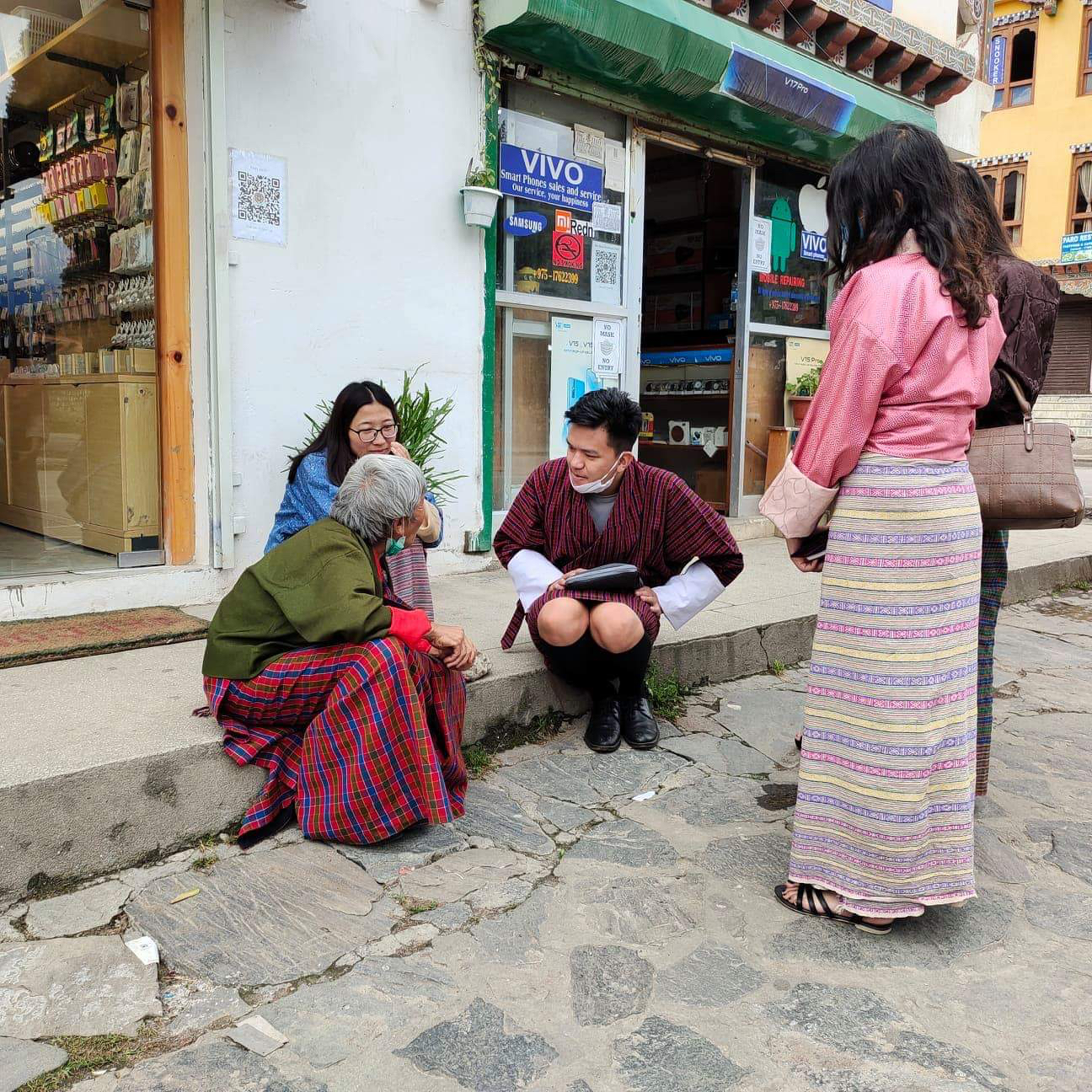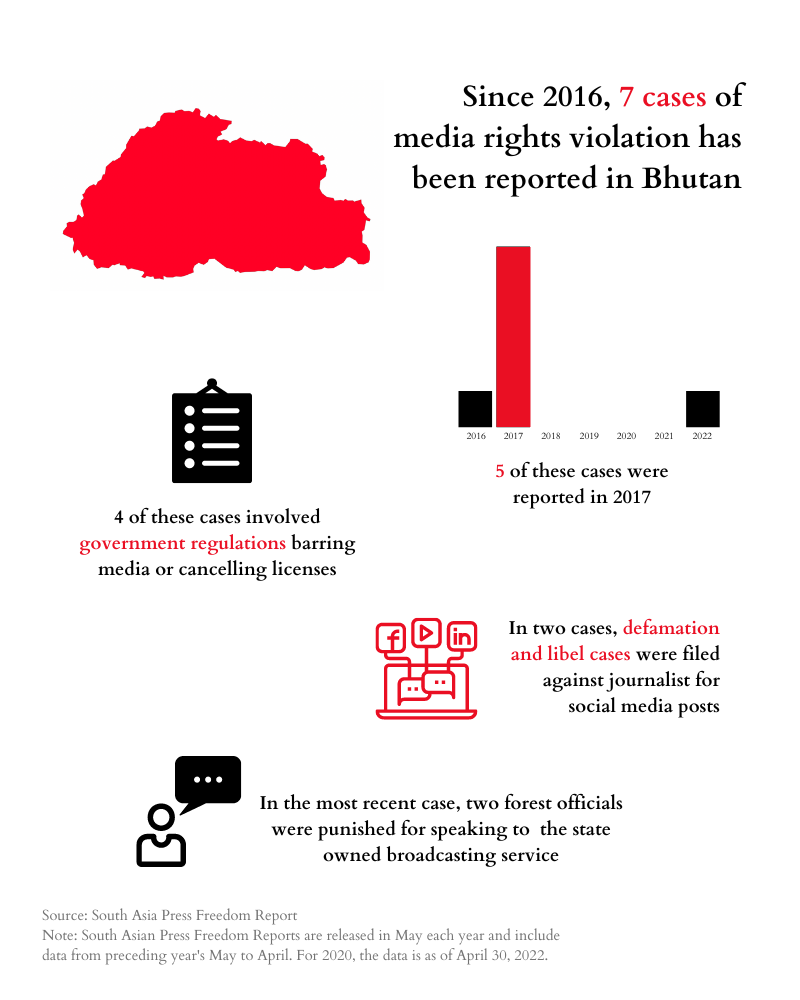BHUTAN
Emerging from the Pandemic

Members of the Journalists’ Association of Bhutan (JAB) are accompanied by the nation’s prime minister, Lotay Tshering, at the launch of the annual Bhutan Press Mirror on World Press Freedom Day, May 3, 2021. Credit: JAB
Emerging from the pandemic
With Covid-19 pandemic-related containment measures and lockdowns marking much of 2021, Bhutan, like other countries across the world, continued to remain affected. The country reeled under economic hardships, including its ailing media industry.
For a small country like Bhutan, located between India and China, the challenges were overwhelming. The three lockdowns in Bhutan over the past year affected all sectors, both government and private, and economic activities literally ground to a halt. The lockdowns imposed intermittently from January to April 2022 not only impacted the survival of the country’s struggling media industry, but also press freedom. The Bhutanese media mostly rely on the government for resources, in the form of advertisements. Due to the serious impact on the country’s economy, the government was forced to cut down public expenditure, including slashing of advertising budgets.
Such austerity measures threaten the very survival of all mainstream media houses in Bhutan, except the state-funded national broadcaster. They also affected media freedom in significant ways. As an important democratic institution, the media has many critical functions, stipulated in the Constitution of Bhutan and in media laws and in the policies of the country. However, due to the limited numbers of reporters and journalists, it is often difficult for media houses to exercise constitutionally guaranteed media freedoms, since freedom of the press means to fulfil the responsibility of informing, educating and entertaining the nation and the people. Today, most newspapers depend on press hand-outs for news. And when newspapers rely on hand-outs, readers lose interest in and respect for journalism.
Many senior and trained professionals left the industry as the print media houses failed to offer them equal pay for equal work. Today, most newsrooms have shrunk to just an editor and two or three reporters. As of March 2022, the Journalists’ Association of Bhutan (JAB) had 91 working journalists as members, including 30 women journalists.
Despite the gloom brought about by the pandemic, JAB recognised 18 journalists for excellence in journalism at its sixth annual journalism awards (AJA) held virtually for the first time in Thimphu on June 2, 2021. AJA is organised annually to reignite the passion for journalism, encourage journalists to pursue stories, and most importantly, contribute toward uplifting professional and ethical standards of journalism in Bhutan.
Changing face of journalism
The pandemic has changed the way in which professional journalism in the country is now practiced. With restrictions on mobility and frequent lockdowns, journalists, who should have been on the spot to report, have had to stay indoors and rely on centralised government information.
From reporting the emergence of Covid-19 at the same time as international media, to localising its impacts and undertaking full-scale coverage, the Bhutanese media attempted to fulfil its role during the pandemic. Journalists made coverage on Covid-19 a priority from their home offices.
The assignment editor with national daily Kuensel, Tashi Dema, however, said that it was not an easy job, especially when it required journalists to verify facts without reliable and accurate sources. She said available information was limited and media houses faced competition from the health ministry and the Prime Minister’s Office (PMO) to ‘break news’. Ironically, the mainstream media were following and reporting the social media pages of the health ministry and PMO.
There was also the challenge of providing timely news. All at a time when journalists were not allowed to move around freely, could not be at the scene and could not conduct in-person interviews. Districts that followed their own Covid-19 protocols made their own rules on the movement of reporters. Such restrictions hampered journalists from doing in-depth reporting and investigation.
Sonam Tshering, a lawyer and regular contributor to Kuensel, said the government became less transparent with each subsequent lockdown. Press conferences reduced significantly, and the media struggled to get quotes from the authorities. “As a result, everyone is forced to rely on official social media pages for any kind of information like a buffalo waiting for the yak story,” he said.
Tshering also said the pandemic led to a rapid increase in information consumption as well as timely access to information. However, due to difficulty experienced by the mainstream media in accessing timely information, social media was routinely inundated with unverified news and misinformation. When the official policy of quarantine was instituted across the country, interviewing people in quarantine became almost impossible.
For example, there were numerous accounts of the poor quality of food in the quarantine facilities, but the mainstream media could not confirm such reports. Similarly, all institutions and offices remained closed for most of the year and the work-from-home policy was implemented. “This further jeopardised access to information since contacting officials became difficult, if not impossible, in certain circumstances affecting the right to information, the right to interview and the right to correct information,” said Tshering.
With the lockdowns, freedom of the media was further strangled and the media’s ability to inform the nation and gather accurate information became impossible at times. While on the one hand there was an explosion of misinformation on social media, on the other, the mainstream media suffered information hunger. During the first national lockdown, at least there were regular government press conferences with some opportunities for media workers to ask questions and scrutinise the government and relay the public opinion to the government.
This all changed during the second lockdown. The government decided not to hold a single press conference and its speeches on national television were considered press briefings. The media’s right to interview, the right to verify information, and the right to question the government was severely restricted. As a result, during the second lockdown, the mainstream media effectively became a forced mouthpiece and post office of the government.
Media Rights Violations
Killings
Arrests
Austerity measures threatened the very survival of all mainstream media houses, except the state-funded national broadcaster. They also affected media freedom in significant ways.

Bhutan’s Prime Minister Lotay Tshering addresses the 76th session of the United Nations General Assembly in a pre-recorded message at UN headquarters on September 25, 2021 in New York. Credit: Eduardo Munoz / AFP / POOL
Press conferences reduced significantly, and the media struggled to get quotes from the authorities. “As a result, everyone is forced to rely on official social media pages for any kind of information like a buffalo waiting for the yak story,” he said.
Spread of an ‘infodemic’
Misinformation and fake news further worsened the functioning of the mainstream media. The government alone controlled the media in a heavy-handed manner, regulating what and when to report, often in the guise of fighting misinformation. “In short, the right to health and collective rights threatened the fundamental freedoms of the media,” said Tshering.
The media watch-dog Media Council of Bhutan (MCB) and Bhutan InfoComm and Media Authority (BICMA) on January 29 and 30, 2022, respectively cautioned media houses for posting what they termed incorrect and inconsistent Covid-19-related information especially on their social media platforms and advised all media houses to follow the Ministry of Health and PMO Bhutan social media pages for timely and accurate information.
Such measures are likely to undermine the fundamentals of democratic values and constitutional mandates. It will also become counterproductive. Less information leads to less transparency and casts more doubt in the public mindset. This can result in an overall loss of public trust and confidence in the government.
The World Health Organization (WHO) defines ‘infodemic’ as “too much information including false or misleading information in digital and physical environments during a disease outbreak” causing confusion and “mistrust in health authorities and undermining the public health response.” When the authorities limit access to information, more gossip, speculation, and conspiracy theories are likely to pop up,.
Media professionals also raised concerns about authorities and newsmakers not sharing information or responding to queries raised by reporters. This was unfortunate because the public deserved timely and factual information, especially during times like this.
The third space
Thirteen years after the first civil society organisation (CSO) was registered, Bhutan today has 62 CSOs. There are almost five new CSOs a year on average, which is a significant achievement. It is a growing civic space often referred to as the ‘third space’ between the government, which is political and the market, which is business. It is a space created and expanded by the citizens for the citizens, without the trappings of power and profit.
Today, Bhutan’s CSOs are spread across a wide range of areas, including media and democracy, health and sanitation, youth and education, environment and conservation, livelihood and poverty, culture and recreation, animal welfare and caregiving, and economic development. And they are doing a good job; reaching the unreached and identifying those who fall through the cracks, doing what CSOs are supposed to do – complementing the government in socio-economic development and democratic participation.
The Bhutanese public is only just beginning to understand civil society and the important role it plays. So far, the growing civic space has proven encouraging despite some teething problems. The Covid-19 pandemic was a reminder of how rapidly society can change and the need to respond quickly at times. Bhutan is seeing the emergence of civic space in the volunteers patrolling the streets, safeguarding borders, serving communities, schools, and people. Many of them are young Guardians of the Peace (De-Suups or volunteers), taxi drivers, Red Cross volunteers, as well as CSO network handling a surge in social and economic disruptions due to the pandemic. In Bhutan’s rural communities too, people came together to support one another in the spirit of interdependence.
The Covid-19 pandemic also revealed how the mainstream media’s role of informing the nation can change during a pandemic. Access to information was crucial for public good and should be facilitated. Positive stories on how every Bhutanese played their part in combating the pandemic and helping each other raised people’s hope. Providing solutions to problems the pandemic created also helped.
In the digital era, online sources and meetings were helpful to media professionals in reporting. Exploring independent and reliable sources have become even more important.
Positive stories on how every Bhutanese played their part in combating the pandemic and helping each other raised people’s hope. Providing solutions to problems the pandemic created also helped.

Members of the Journalists’ Association of Bhutan (JAB). Credit: Supplied
In pursuit of gender equality
Capacity building on gender issues is a priority with JAB. A training workshop was organised with the objective of sharing professional and personal experiences on gender issues and to understand how to deal with them in a gender-sensitive manner. It also shed light on the problems and gaps in the media through a gender perspective.
A two-day training was organised by JAB in collaboration with Bhutan Network for Empowering Women (BNEW) from September 26-28, 2021, in Paro. Thirty journalists from various media organisations including freelance members of JAB attended with the workshop focussing on the concept of power, hierarchy and gender discrimination. Concepts related to gender mainstreaming and tools to achieve it were also discussed and strengthened the participants’ understanding and renewed a sense of responsibility towards addressing gender issues in the country.
Union’s activities
Prime Minister Dr Lotay Tshering launched the fourth edition of JAB’s journal, Bhutan Press Mirror, coinciding with World Press Freedom Day on May 3, 2021. It is an annual journal that mirrors the situation of journalism and highlights issues related to the media industry in Bhutan.
Over the last one year, although there were many activities planned, JAB could only implement a few because of the pandemic and frequent lockdowns. Despite the challenges, JAB managed to conduct 12 community media workshops in remote districts in eastern, western, southern and central parts of the country. The workshops aimed to enhance media knowledge of rural people to improve coverage of rural issues in the mainstream media and to create a link between community members and media. The workshop also encouraged people in far-flung rural areas to share news and information through social media. A total of 667 community members were trained and JAB met its target of gender balance by having at least 50 per cent female inclusion in the workshop.
The way forward
With a total population of just over 750,000, Bhutan’s Covid-19 cases reached 20,722 by March 17, 2022, and seven lives were lost. As in other countries, the greatest loss of lives occurred when health facilities were overwhelmed during peak infection periods, depriving people of critical care. It was also mainly the unvaccinated who lost their lives.
The government’s strategy going forward is to try and prevent infections as much as possible without lockdowns. It is also to continue to provide vaccines to as large a percentage of the population as possible, along with medical care to those with positive cases. With this strategy in place, Bhutan is returning to the new normal. Media houses also expect that there will be more access and free flow of information once the country starts living with virus.
Such a bold decision, which will be implemented from mid-April, comes after achieving laudable success in managing the pandemic. Bhutan’s strategy was guided by the Royal Command that believes that the lives of Bhutanese people should be the government’s greatest priority. Due to this strategy, wide-spread vaccination and the wholehearted support of the people, Bhutan has emerged largely unscathed – even during the most dangerous periods of the pandemic. Opening up the country to international travellers and reducing quarantine periods in April 2022, signalled a cautious return to normalcy.
Conclusion
The landscape of the Bhutanese media will keep changing as it does everywhere else in the world. In an age of rapidly evolving technology the form of media is unpredictable, but the mandate and character of media – freedom of expression – is not. Considering Bhutan’s current media landscape vis-à-vis the enormity of its democratic mandate, the government needs to play an instrumental role in enabling media plurality and diversity and a vibrant public space for discourse and debate.

